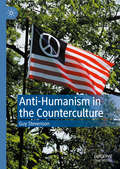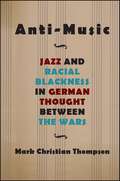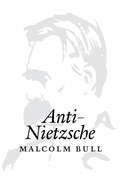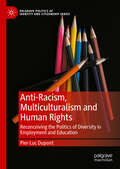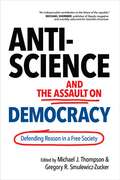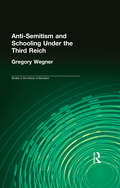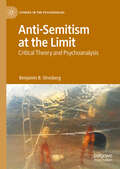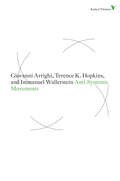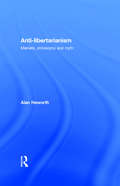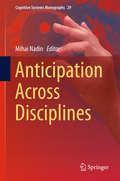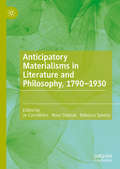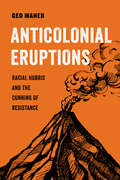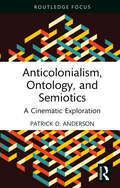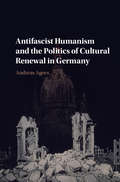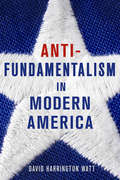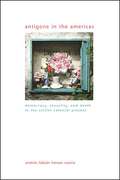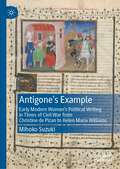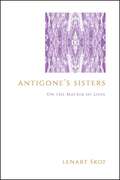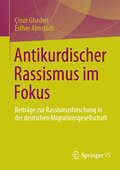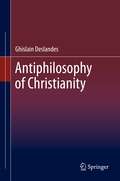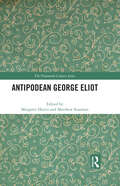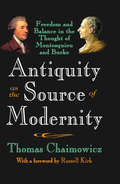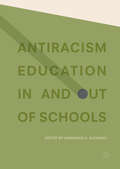- Table View
- List View
Anti-Humanism in the Counterculture
by Guy StevensonThis book offers a radical new reading of the 1950s and 60s American literary counterculture. Associated nostalgically with freedom of expression, romanticism, humanist ideals and progressive politics, the period was steeped too in opposite ideas – ideas that doubted human perfectibility, spurned the majority for a spiritually elect few, and had their roots in earlier politically reactionary avant-gardes. Through case studies of icons in the counterculture – the controversial sexual revolutionary Henry Miller, Beat Generation writers Jack Kerouac, Allen Ginsberg and William S. Burroughs and self-proclaimed ‘philosopher of hip’, Norman Mailer – Guy Stevenson explores a set of paradoxes at its centre: between romantic optimism and modernist pessimism; between brutal rhetoric and emancipatory desires; and between social egalitarianism and spiritual elitism. Such paradoxes, Stevenson argues, help explain the cultural and political worlds these writers shaped – in their time and beyond.
Anti-Music: Jazz and Racial Blackness in German Thought between the Wars (SUNY series, Philosophy and Race)
by Mark Christian ThompsonAnti-Music examines the critical, literary, and political responses to African American jazz music in interwar Germany. During this time, jazz was the subject of overt political debate between left-wing and right-wing interests: for the left, jazz marked the death knell of authoritarian Prussian society; for the right, jazz was complicit as an American import threatening the chaos of modernization and mass politics. This conflict was resolved in the early 1930s as the left abandoned jazz in the face of Nazi victory, having come to see the music in collusion with the totalitarian culture industry. Mark Christian Thompson recounts the story of this intellectual trajectory and describes how jazz came to be associated with repressive, virulently racist fascism in Germany. By examining writings by Hermann Hesse, Bertolt Brecht, T.W. Adorno, and Klaus Mann, and archival photographs and images, Thompson brings together debates in German, African American, and jazz studies, and charts a new path for addressing antiblack racism in cultural criticism and theory.
Anti-Nietzsche
by Malcolm BullNietzsche, the philosopher seemingly opposed to everyone, has met with remarkably little opposition himself. He remains what he wanted to be-- the limit-philosopher of a modernity that never ends. In this provocative, sometimes disturbing book, Bull argues that merely to reject Nietzsche is not to escape his lure. He seduces by appealing to our desire for victory, our creativity, our humanity. Only by 'reading like a loser' and failing to live up to his ideals can we move beyond Nietzsche to a still more radical revaluation of all values--a subhumanism that expands the boundaries of society until we are left with less than nothing in common.Anti-Nietzsche is a subtle and subversive engagement with Nietzsche and his twentieth-century interpreters--Heidegger, Vattimo, Nancy, and Agamben. Written with economy and clarity, it shows how a politics of failure might change what it means to be human.
Anti-Racism, Multiculturalism and Human Rights: Reconceiving the Politics of Diversity in Employment and Education (Palgrave Politics of Identity and Citizenship Series)
by Pier-Luc DupontThe continuing prevalence of racial inequality and discrimination is well documented in Britain. While there are multiple accounts of how state institutions are shaped by and reproduce racism, much less has been said about their current and potential contribution to anti-racism. This book elucidates the long-term impact on racism of positive action in employment and multicultural school curricula. It also explores whether international human rights law creates a duty for states to adopt these policies. Positive action and multicultural curricula are not new and have long been advocated by multiculturalists, but this book systematically unpacks how they can counter four structural drivers of racism: racialised national identities, racialised power inequalities, racial fearmongering, and racial segregation. The book goes on to examine the extent to which they have been implemented in Britain, as well as the legal and political opportunities for future development.
Anti-Science and the Assault on Democracy: Defending Reason in a Free Society
by Michael J. Thompson and Gregory R. Smulewicz-ZuckerDefending the role that science must play in democratic society--science defined not just in terms of technology but as a way of approaching problems and viewing the world. In this collection of original essays, experts in political science, the hard sciences, philosophy, history, and other disciplines examine contemporary anti-science trends, and make a strong case that respect for science is essential for a healthy democracy. The editors note that a contradiction lies at the heart of modern society. On the one hand, we inhabit a world increasingly dominated by science and technology. On the other, opposition to science is prevalent in many forms--from arguments against the teaching of evolution and the denial of climate change to the promotion of alternative medicine and outlandish claims about the effects of vaccinations. Adding to this grass-roots hostility toward science are academics espousing postmodern relativism, which equates the methods of science with regimes of "power-knowledge." While these cultural trends are sometimes marketed in the name of "democratic pluralism," the contributors contend that such views are actually destructive of a broader culture appropriate for a democratic society. This is especially true when facts are degraded as "fake news" and scientists are dismissed as elitists. Rather than enhancing the capacity for rational debate and critical discourse, the authors view such anti-science stances on either the right or the left as a return to premodern forms of subservience to authority and an unwillingness to submit beliefs to rational scrutiny. Beyond critiquing attitudes hostile to science, the essays in this collection put forward a positive vision for how we might better articulate the relation between science and democracy and the benefits that accrue from cultivating this relationship.
Anti-Semitism and Schooling Under the Third Reich (Studies in the History of Education)
by Gregory WegnerThis book investigates the anti-Semitic foundations of Nazi curricula for elementary schools, with a focus on the subjects of biology, history, and literature. Gregory Paul Wegner argues that any study of Nazi society and its values must probe the education provided by the regime. Schools, according to Wegner, play a major role in advancing ideological justifications for mass murder, and in legitimizing a culture of ethnic and racial hatred. Using a variety of primary sources, Wegner provides a vivid account of the development of Nazi education.
Anti-Semitism at the Limit: Critical Theory and Psychoanalysis (Studies in the Psychosocial)
by Benjamin B. StrosbergIn this book, Benjamin Strosberg explores difficulties and anxieties inherent in studying, defining, and defending against anti-Semitism by tracing a concurrent difficulty in thinking about Jewishness, which has historically served as a limit case for central social categories such as outsider, religion, race, gender, and nation. Dr. Strosberg draws on Zygmunt Bauman’s concept of proteophobia—the anxious fear of what doesn’t fit into clear-cut categories—to think more carefully about anti-Semitism as response to the complex-realities of ambivalence and otherness. The book proposes ‘negative psychology’ as a methodology for studying anti-Semitism and proteophobia rooted in psychoanalysis and Theodor Adorno’s Critical Theory. Drawing from lived experiences, contemporary events, and debates in the field, this compelling work explores the broad implications of the investigation of anti-Semitism for politics, education, and psychoanalysis, as well as the specific implications for Jewish identity and resistance.
Anti-Systemic Movements
by Giovanni Arrighi Terence K. Hopkins Immanuel WallersteinBuilding on an analysis of the dissenting movements to have emerged since the rise of modern capitalism, Anti-Systemic Movements uncovers an international groundswell of resistance still vitally active at the end of the twentieth century. The authors suggest that the new assertiveness of the South, the development of class struggle in the East and the emergence of rainbow coalitions in various regions hold fresh promise for emancipatory politics. Taking the year 1968 as a symbolic turning point, the authors argue that new anti-systemic movements have arisen which challenge the logic of the capitalist world-system.
Anti-libertarianism: Markets, philosophy and myth
by Alan HaworthFree marketeers claim that theirs is the only economic mechanism which respects and furthers human freedom. Socialism, they say, has been thoroughly discredited. Most libertarians treat the state in anything other than its minimal, 'nightwatchman' form as a repressive embodiment of evil. Some reject the state altogether.But is the 'free market idea' a rationally defensible belief? Or do its proponents fail to examine the philosophical roots of their so-called freedom? Anti-libertarianism takes a sceptical look at the conceptual tenets of free market politics. Alan Haworth argues that libertarianism is little more than an unfounded, quasi-religious statement of faith: a market romance. Moreover, libertarianism is exposed as profoundly antithetical to the very freedom which it purports to advance.This controversial book is for anyone interested in the cultural and political impact of free market policies on the modern world. It will be invaluable to students and specialists of political and economic theory, social science and philosophy.
Anticipation Across Disciplines (Cognitive Systems Monographs #29)
by Mihai NadinNever before was anticipation more relevant to the life and activity of humankind than it is today. "It is no overstatement to suggest that humanity's future will be shaped by its capacity to anticipate. . . . " (Research Agenda for the 21st Century, National Science Foundation). The sciences and the humanities can no longer risk explaining away the complexity and interactivity that lie at the foundation of life and living. The perspective of the world that anticipation opens justifies the descriptor "the post-Cartesian Revolution. " If anticipation is a valid research domain, what practical relevance can we await? Indeed, anticipation is more than just the latest catch-word in marketing the apps developed by the digital technology industry. Due to spectacular advances in the study of the living, anticipation can claim a legitimate place in current investigations and applications in the sciences and the humanities. Biology, genetics, medicine, as well as politics and cognitive, behavioral, and social sciences, provide rich evidence of anticipatory processes at work. Readers seeking a foundation for an ticipation will find in these pages recent outcomes pertinent to plant life, political anticipation, cognitive science, architecture, computation. The authors contributing to this volume frame experimental data in language that can be shared among experts from all fields of endeavor. The major characteristic is the inference from the richness of data to principles and practical consequences.
Anticipatory Materialisms in Literature and Philosophy, 1790–1930
by Jo Carruthers Nour Dakkak Rebecca SpenceAnticipatory Materialisms explores nineteenth and early twentieth-century literature thatanticipates and pre-empts the recent philosophical ‘turn’ to materiality and affect. Critical volumes that approach literature via the prism of New Materialism are in the ascendence. This collection stakes a different claim: by engaging with neglected theories of materiality in literary and philosophical works that antedate the twenty-first century ‘turn’ to New Materialism and theories of affect, the project aims to establish a dialogue between recent theoretical considerations of people-world relations in literature and that which has gone before. This project seeks to demonstrate the particular and meaningful ways in which interactions between people and the physical world were being considered in literature between the nineteenth and early twentieth centuries. The project does not propose an air of finality; indeed, it is our hope that offering provocative and challenging chapters, which approach the subject from various critical and thematic perspectives, the collection will establish a broader dialogue regarding the ways in philosophy and literature have intersected and informed each other over the course of the long nineteenth century.
Anticolonial Eruptions: Racial Hubris and the Cunning of Resistance (American Studies Now: Critical Histories of the Present #15)
by Geo MaherThis incisive study reveals the fundamental, paradoxical weakness of colonialism and the enduring power of anticolonial resistance. Resistance is everywhere, but everywhere a surprise, especially when the agents of struggle are the colonized, the enslaved, the wretched of the earth. Anticolonial revolts and slave rebellions have often been described by those in power as "eruptions"—volcanic shocks to a system that does not, cannot, see them coming. In Anticolonial Eruptions, Geo Maher diagnoses a paradoxical weakness built right into the foundations of white supremacist power, a colonial blind spot that grows as domination seems more complete. Anticolonial Eruptions argues that the colonizer’s weakness is rooted in dehumanization. When the oppressed and excluded rise up in explosive rebellion, with the very human demands for life and liberation, the powerful are ill-prepared. This colonial blind spot is, ironically, self-imposed: the more oppressive and expansive the colonial power, the lesser-than-human the colonized are believed to be, the greater the opportunity for resistance. Maher calls this paradox the cunning of decolonization, an unwitting reversal of the balance of power between the oppressor and the oppressed. Where colonial power asserts itself as unshakable, total, and perpetual, a blind spot provides strategic cover for revolutionary possibility; where race or gender make the colonized invisible, they organize, unseen. Anticolonial Eruptions shows that this fundamental weakness of colonialism is not a bug, but a permanent feature of the system, providing grounds for optimism in a contemporary moment roiled by global struggles for liberation.
Anticolonialism, Ontology, and Semiotics: A Cinematic Exploration (Routledge Focus on Film Studies)
by Patrick D. AndersonAnticolonialism, Ontology, and Semiotics places anticolonial theory, semiotic analysis, and contemporary Hollywood film into conversation. Synthesizing Algirdas Greimas’ semiotic square with the theories of anticolonial philosophers like Frantz Fanon, Eldridge Cleaver, and Sylvia Wynter, Anderson reconstructs an anticolonial social ontology for use as a method of film analysis. Using this ontology to interpret a wide range of films, the book defies the assumptions and challenges the conclusions of postcolonial and intersectional approaches. Reaching beyond the application of anticolonial theory for the purpose of film criticism, the book uses theory to interpret film while using film to illustrate and interpret theory. Along the way, readers are challenged to reconsider class, race, gender, sexuality, violence, and liberation not only in the cinematic world but also in the worlds we all inhabit.This concise yet broad-reaching work will interest scholars and students of film studies, film philosophy, anticolonialism and postcolonialism, race and gender studies.
Antifascist Humanism and the Politics of Cultural Renewal in Germany
by Andreas AgocsAntifascism is usually described as either a political ideology of activists and intellectuals confronting the dictatorships of Hitler and Mussolini, or as a cynical tool that justified the Stalinist expansion of communism in Europe. Andreas Agocs widens our understanding of antifascism by placing it in the context of twentieth-century movements of 'cultural renewal'. He explores the concept of 'antifascist humanism', the attempt by communist and liberal intellectuals and artists to heal the divisions of Nazism by reviving the 'other Germany' of classical Weimar. This project took intellectual shape in German exile communities in Europe and Latin America during World War II and found its institutional embodiment in the Cultural League for Democratic Renewal in Soviet-occupied Berlin in 1945. During the emerging Cold War, antifascist humanism's uneasy blend of twentieth-century mass politics and cultural nationalism became the focal point of new divisions in occupied Germany and the early German Democratic Republic. This study traces German traditions of cultural renewal from their beginnings in antifascist activism to their failure in the emerging Cold War.
Antifundamentalism in Modern America
by David Harrington WattDavid Harrington Watt's Antifundamentalism in Modern America gives us a pathbreaking account of the role that the fear of fundamentalism has played—and continues to play—in American culture. Fundamentalism has never been a neutral category of analysis, and Watt scrutinizes the various political purposes that the concept has been made to serve. In 1920, the conservative Baptist writer Curtis Lee Laws coined the word "fundamentalists." Watt examines the antifundamentalist polemics of Harry Emerson Fosdick, Talcott Parsons, Stanley Kramer, and Richard Hofstadter, which convinced many Americans that religious fundamentalists were almost by definition backward, intolerant, and anti-intellectual and that fundamentalism was a dangerous form of religion that had no legitimate place in the modern world. For almost fifty years, the concept of fundamentalism was linked almost exclusively to Protestant Christians. The overthrow of the Shah of Iran and the establishment of an Islamic republic led to a more elastic understanding of the nature of fundamentalism. In the late 1970s and early 1980s, Americans became accustomed to using fundamentalism as a way of talking about Muslims, Jews, Hindus, Sikhs, and Buddhists, as well as Christians. Many Americans came to see Protestant fundamentalism as an expression of a larger phenomenon that was wreaking havoc all over the world. Antifundamentalism in Modern America is the first book to provide an overview of the way that the fear of fundamentalism has shaped U.S. culture, and it will lead readers to rethink their understanding of what fundamentalism is and what it does.
Antigone in the Americas: Democracy, Sexuality, and Death in the Settler Colonial Present (SUNY series in Gender Theory)
by Andrés Fabián Henao CastroSophocles's classical tragedy, Antigone, is continually reinvented, particularly in the Americas. Theater practitioners and political theorists alike revisit the story to hold states accountable for their democratic exclusions, as Antigone did in disobeying the edict of her uncle, Creon, for refusing to bury her brother, Polynices. Antigone in the Americas not only analyzes the theoretical reception of Antigone, when resituated in the Americas, but further introduces decolonial rumination as a new interpretive methodology through which to approach classical texts. Traveling between modern present and ancient past, Andrés Fabián Henao Castro focuses on metics (resident aliens) and slaves, rather than citizens, making the feminist politics of burial long associated with Antigone relevant for theorizing militant forms of mourning in the global south. Grounded in settler colonial critique, black and woman of color feminisms, and queer and trans of color critique, Antigone in the Americas offers a more radical interpretation of Antigone, one relevant to subjects situated under multiple and interlocking systems of oppression.
Antigone's Example: Early Modern Women's Political Writing in Times of Civil War from Christine de Pizan to Helen Maria Williams
by Mihoko SuzukiThis book investigates early modern women’s interventions in politics and the public sphere during times of civil war in England and France. Taking this transcultural and comparative perspective, and the period designation “early modern” expansively, Antigone’s Example identifies a canon of women’s civil-war writings; it elucidates their historical specificity as well as the transhistorical context of civil war, a context which, it argues, enabled women’s participation in political thought.
Antigone's Sisters: On the Matrix of Love (SUNY series in Theology and Continental Thought)
by Lenart ŠkofIn Antigone's Sisters, Lenart Škof explores the power of love in our world—stronger than violence and, ultimately, stronger even than death. Focusing on Antigone, Savitri, and Mary, the book offers an investigation into various goddesses and feminine figures from a variety of philosophical, mythological, theological, and literary contexts. The book also elaborates on the feminine aspects of selected concepts from modern philosophical texts, such as the Matrix in Jakob Böhme, Clara in F. W. J. Schelling, beyng in Martin Heidegger, chóra in Jacques Derrida, and breath in Luce Irigaray's thought. Drawing on Bracha M. Ettinger's concept of matrixiality, Škof proposes a new matrixial theory of philosophy, cosmology, and theology of love. Despite its many usages and appropriations, love remains a neglected topic within Western philosophy. With its new interpretation of Antigone and related readings of Irigaray, Kristeva, and Ettinger, Antigone's Sisters aims to identify some of the reasons for this forgetting of love, and to show that it is only love that can bring peace to our ethically disrupted world.
Antigone, Interrupted
by Bonnie HonigSophocles' Antigone is a touchstone in democratic, feminist and legal theory, and possibly the most commented upon play in the history of philosophy and political theory. Bonnie Honig's rereading of it therefore involves intervening in a host of literatures and unsettling many of their governing assumptions. Exploring the power of Antigone in a variety of political, cultural, and theoretical settings, Honig identifies the 'Antigone-effect' - which moves those who enlist Antigone for their politics from activism into lamentation. She argues that Antigone's own lamentations can be seen not just as signs of dissidence but rather as markers of a rival world view with its own sovereignty and vitality. Honig argues that the play does not offer simply a model for resistance politics or 'equal dignity in death', but a more positive politics of counter-sovereignty and solidarity which emphasizes equality in life.
Antikurdischer Rassismus im Fokus: Beiträge zur Rassismusforschung in der deutschen Migrationsgesellschaft
by Çinur Ghaderi Esther AlmstadtÇinur Ghaderi und Esther Almstadt machen in diesem Band Diskriminierungs- und Rassismuserfahrungen von Kurd*innen in der Migrationsgesellschaft sichtbar und vermitteln Wissen zu Kurd*innen in Deutschland. Sie richten damit den Fokus auf eine Leerstelle in der ohnehin noch jungen Rassismusforschung in Deutschland. Ihre Forschungsergebnisse beruhen vor allem auf qualitativen Interviews mit Akteur*innen aus unterschiedlichen gesellschaftlichen Bereichen und einer Medienanalyse zur Darstellung von Kurd*innen, die in einen Definitionsvorschlag für Antikurdischen Rassismus münden und bildungspolitische Handlungsperspektiven eröffnen. Zielgruppen sind Studierende, Forschende, Lehrende, Praktiker*innen unterschiedlicher sozialwissenschaftlicher Disziplinen und Interessierte aus Politik und Gesellschaft, die sich über Kurd*innen in Deutschland und ihre Diskriminierungs- und Rassismuserfahrungen informieren möchten und hieraus Handlungsperspektiven entwickeln möchten.
Antiochus and Peripatetic Ethics (Cambridge Classical Studies)
by Georgia TsouniThis book offers a fresh analysis of the account of Peripatetic ethics in Cicero's On Ends 5, which goes back to the first-century BCE philosopher Antiochus of Ascalon. Georgia Tsouni challenges previous characterisations of Antiochus' philosophical project as 'eclectic' and shows how his reconstruction of the ethics of the 'Old Academy' demonstrates a careful attempt to update the ancient heritage, and predominantly the views of Aristotle and the Peripatos, in the light of contemporary Stoic-led debates. This results in both a hermeneutically complex and a philosophically exciting reading of the old tradition. A case in point is the way Antiochus grounds the 'Old Academic' conception of the happy life in natural appropriation (oikeiosis), thus offering a naturalistic version of Aristotelian ethics.
Antiphilosophy of Christianity
by Ghislain DeslandesThis text presents and addresses the philosophical movement of antiphilosophy working thru the texts of Christian thinkers such as Pascal and Kierkegaard. The author as influenced by Alain Badiou, portrays these Christian thinkers as of a subjective dimension negating the possibility of an objective quest for truth. The claim here is that antiphilosophy is abundant in the eyes of these two thinkers who frame the thought event as represented by Christianity, ultimately resigning itself to more or less the opposite of philosophy itself. Readers will discover why philosophical reason should never be convinced by that which denies its very authority.Subjecting faith to the perils of philosophical analysis, confronting the philosophical tradition with the truth of the Christian faith, and occupying the space between the two: such are the challenges facing an antiphilosophy of Christianity. This text will appeal to researchers and students working in continental philosophy, philosophy of religion and those in religious studies who want to investigate the links between Christianity and antiphilosophy.
Antipodean George Eliot (The Nineteenth Century Series)
by Margaret Harris Matthew SussmanIn Middlemarch, George Eliot famously warns readers not to see themselves as the centre of their own world, which produces a ‘flattering illusion of concentric arrangement’. The scholarly contributors to Antipodean George Eliot resist this form of centrism. Hailing from four continents and six countries, they consider Eliot from a variety of de-centred vantage points, exploring how the obscure and marginal in Eliot’s life and work sheds surprising light on the central and familiar. With essays that span the full range of Eliot’s career—from her early journalism, to her major novels, to eccentric late works such as Impressions of Theophrastus Such—Antipodean George Eliot is committed to challenging orthodoxies about Eliot’s development as a writer, overturning received ideas about her moral and political thought, and unveiling new contexts for appreciating her unparalleled significance in nineteenth-century letters.
Antiquity as the Source of Modernity: Freedom and Balance in the Thought of Montesquieu and Burke
by Thomas ChaimowiczThis is a book that contrary to common practice, shows the commonalities of ancient and modern theories of freedom, law, and rational actions. Studying the works of the ancients is necessary to understanding those that follow. Thomas Chaimowicz challenges current trends in research on antiquity in his examination of Montesquieu's and Burk's path of inquiry. He focuses on ideas of balance and freedom. Montesquieu and Burke believe that freedom and balance are closely connected, for without balance within a state there can be no freedom.When Montesquieu speaks of republics, he means those of antiquity as they were understood in the eighteenth century. In this view, freedom can develop only within the framework of established tradition. Edmund Burke's greatest service to political thought may lie in making use of this idea when he fought against the abstractions of the French Revolutionaries. Antiquity as the Source of Modernity examines Montesquieu's Roman mind, meaning not an attitude influenced by the ancients, but one primarily influenced by Roman heritage. It speaks to the antithesis of monarchy and despotism in Montesquieu's thought and the influence of Tacitus and Pliny the Younger on him. The separation of powers and its relation to the concept of the mixed constitution as well as Montesquieu's smaller masterpiece Considerations on the Causes of the Grandeur and Decadence of the Romans are examined in detail. Finally, the discussion leads seamlessly to Burke, who, as a critical admirer of Montesquieu, partly incorporated his interpretation of the English constitution into his own thinking threatened by teachings of the French Revolution and its British adherents.The central idea of Antiquity as the Source of Modernity is timeless. It is that the ancient past can lead to a clearer understanding of what follows. This perspective represents a reversal of the conventional procedures for conducting this kind of research,
Antiracism Education In and Out of Schools
by Aminkeng A. AlemanjiThis book explores how antiracism theories can be translated into practice within formal education, as well as in other educational programs outside schools, as very often racism occurs outside the school environment. Combating racism both in and out of school therefore increases the chances of overcoming issues of racism. As racism continues to plague the world, efforts to combat it deserve more attention and diversification across all walks of life. In education, such efforts benefit from being modeled within the framework of antiracism education, rather than simpler multicultural and intercultural theorization and understanding which have proved popular. As such, this book critiques integration and multicultural programs, and instead highlights the advantages of grounding such programs within an antiracist framework. This book demonstrates why and how antiracism education is key to challenging issues of racial injustice at a time when multiculturalism and interculturalism have being proclaimed "dead". It will be highly relevant to researchers and students working in the areas of Education and Sociology, particularly those with an interest in antiracism methodologies.
